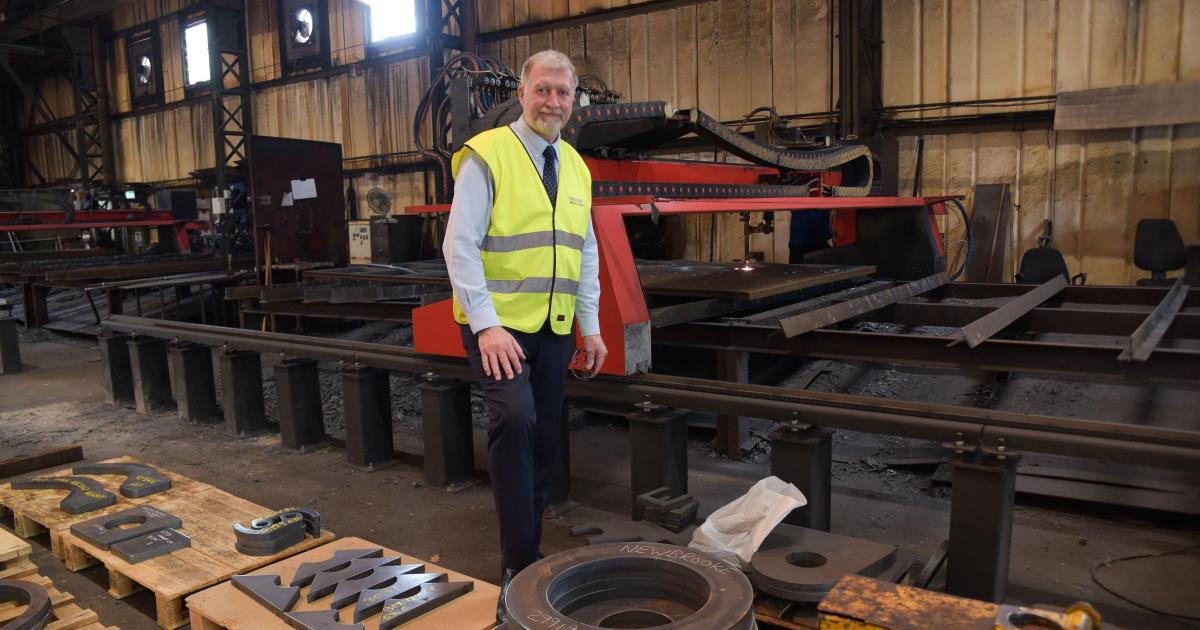British steel is facing its biggest crisis in its history after the EU announced it will fast-track plans to cut the amount of steel that can be imported tax-free into the bloc, increasing the tariff rate from 25pc to 50pc to protect the European sector.
British steel is facing its biggest crisis in its history after the EU announced plans for 50pc tariffs on imported UK steel(Image: Danny Lawson)
The UK exported 78pc of its steel – 1.9 million tonnes – to the EU last year, producing four million tonnes of steel for both domestic and foreign markets.
READ MOVE: Why British Steel’s survival could prove critical for future of firms in the east
“Companies could be forced to downsize and lay people off, or the worst case scenario is that they end up closing,” said Roy Denyer, sales director at Thetford-based Pegasus Profiles, which cuts and processes steel plate for a range of industries and applications.
Roy Denyer, sales director at Pegasus Profiles in Thetford(Image: Sonya Duncan)
“It’s already a very tight market and there’s no real growth. People are struggling for good levels of work and some are very quiet, particularly the machine shops and structural fabricators.
“The knock-on effect could be that whole situation gets worse. The government must do all it can to repel the tariff with the EU because it’s going to cause a lot of issues.”
Industry minister Chris McDonald has said that the government will defend the country’s “critical” steel industry and push the European Commission for urgent clarification of the impact of the tariff on the UK.
Industry Minister Chris McDonald(Image: Jacob King)
“The government must defend it,” Mr Denyer said. “It would be a disaster for the whole country if we were to lose our steel industry.
“But if they react by retaliating with a similar tariff level it wouldn’t help anybody as it would just force everybody’s costs up.”
Roy Denyer, sales director at Pegasus Profiles in Thetford(Image: Sonya Duncan)
The director general of UK Steel has said a 50pc tariff on British steel would be “devastating” for the industry.
Speaking to Times Radio, Gareth Stace said: “The US has closed off its steel market to imports and today what we’ve seen is the EU proposing to do the same.
“We’re seeing a rapid rise of protectionist trade measures all over the world. And let me tell you, the last country to defend its steel industry will be the first country to de-industrialise. This is a massive issue for our sector.
“If the UK government can’t get round the table with the EU and convince the EU that we’re their friend, not their enemy, then we will see job losses in our sector – the like we haven’t seen for a number of years.”
A steel worker at one of the blast furnaces at the British Steel’s Scunthorpe plant(Image: Darren Staples/PA Wire)
Donald Trump’s tariffs on steel imports have hurt the EU’s industry as subsidised Asian steel has been diverted from the US market and saturated Europe.
“The way Trump went about his US tariffs was bullish and the ripples from that continue to cause fallout,” Mr Denyer said.
“The EU are reacting and they’ve reacted in a very extreme way. Yes, it might be to protect their market, but it’s not going to help the companies in the EU that are buying material from the UK.
“There is a lot of material that is needed by European companies, so they will struggle to carry on making the products they produce, or the buildings they produce, if they can’t get the product.”
British Steel’s Scunthorpe plant in north Lincolnshire was saved in April when the government passed emergency legislation(Image: Peter Byrne/PA Wire)
Earlier this year, the government passed emergency legislation to save British Steel’s Scunthorpe plant from closure, with a £500m deal later being struck with the rail network to safeguard the steelworks’ short-term future.
The five-year contract will see British Steel forge more than 337,000 tonnes of train tracks for Network Rail, securing thousands of jobs.
“We are now at a point where we are decarbonising our steel industry with the move to electric arc furnaces,” Mr Denyer added.
“We’re still going a year or two away before that investment comes to fruition, but by the time we get to that point there might not be a steel industry left to use it, which would be absolutely catastrophic.”
